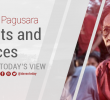ONCE again the Filipino nation is faced with a crisis. It is a crisis that cuts across the moral and political character of the leadership in government. And because of this, a feeling of uncertainty hangs like a dark cloud in the minds of the citizenry. A serious doubt has been expressed whether the government headed by President Benigno S. Aquino III can still lead the nation with the moral force of effective governance.
In the first place, the Supreme Court has already rendered its verdict declaring the Disbursement Acceleration Fund (DAP) unconstitutional, in effect characterizing it as an undertaking that partakes of graft and corrupt practice. Because of the staggering amounts involved it constitutes “large scale corruption and malversation of public funds” Even for this alone, the official ground on which President Aquino stands as Chief Executive is already shaky and puts him in dubious moral ascendancy.
Secondly, With the series of serious lapses in the way he handles the recent tragic incident in Maguindanao Mr. Noynoy Aquino is fast slipping into the status of a “lameduck president”. There is an undeniable seeds of growing dissension in the ranks of the men in uniform. They are confused by the lack of a definite officer in command in the PNP branch of the State’s armed security forces. They have shown a lack of trust in their Commander-in-Chief who is himself in evident state of bewilderment if not outright stupefaction. The same is true with Mr. Mar Roxas of the DILG and the PNP Chief General Espina — they were “not in the loop”, they said. No high official in the helm of authority seemed to be in touch with the concrete situation on the ground. Nobody seemed to be in control of what happened.
In the midst of all this perplexing situation the President has been found wanting in honesty, sincerity and competence. His inconsistencies in words and actions are evident manifestations of his unfitness for the highest post of the land. No. The function of one charged with the lofty honor and responsibility of leading a nation cannot be entrusted to Mr. Benigno S. Aquino III. His continued assumption of duties as President poses disastrous consequences that could befall the nation-state.
All in all, the Mamasapano incident which has jolted the citizenry to shock, anxiety, uncertainty and anger has exposed the hollowness of President Aquino’s public utterances and speeches. All in all, his glib tongue manifests adroitness in doublespeak and firm commitment to lies and deceit.
As of now, all evidences point to a state of crisis— crisis in leadership.
In face of this bewildering state of affairs an exigency has arisen calling for a course of action to put every thing in order. Already, some Catholic bishops and concerned individuals and groups from a wide spectrum of the population have called on President Noynoy Aquino to “step down”.
But an anxious albeit logical question is raised, “Who will take his place?” The Vice-President who is himself riddled with accusations of immoral and unlawful offenses? NO! Not Binay! Neither Senate President Drilon! Nor House Speaker Belmonte! No traditional politician should sit as President after Mr. Noynoy Aquino steps down from his throne.! A clearresounding NO TO TRAPO! batters the people’s conscience doors.
And an equally resounding THEN WHO? echoes in most everyone’s heart and mind.
Ah, the informed sector in society seems to be prepared with the apt answer. A sort of “Revolutionary Transformation Council” should be created to hold the reins of a transitory coalition government that will overhaul the system and install fundamental reforms in conformance with the supreme interests and aspirations of the masses of the people now crawling in utter misery under the incumbent social order. In other words, the Status Quo must give way to a new social architecture. The incumbent government apparatus has shown for several decades its incapacity and uselessness in nation building, let alone in resolving the problems of poverty and underdevelopment in the country. A new nation shall be rebuilt under an entirely new system.
What the essential features of this alternative society shall be would be the task of the Revolutionary Transformation Council to define and design and install within a specific period of time. This Body, highly demanding and noble be its function, shall lead the transformation process with transparency and accountability to the people. It shall harness, mobilize and enlist the participation of persons with proven integrity and probity and competence. It will not be difficult to determine who they are because they have been in their own unwavering advocacies and engagements for the people’s welfare in the various fields and undertakings for social transformation through all these years.






